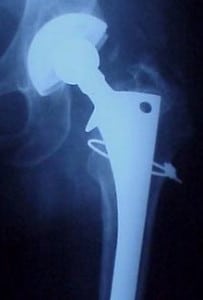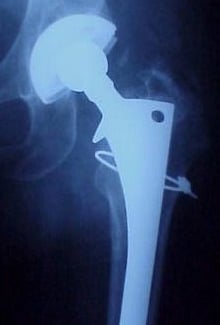Perhaps you’ve had a conversation with a friend or a family member who has had a hip
replacement.  The discussion may have turned toward the type of hip implant used, but the individual may not have know which one he or she received.
The discussion may have turned toward the type of hip implant used, but the individual may not have know which one he or she received.
With all the reports of hip recalls and related lawsuits in California and elsewhere, it’s understandable that an implant recipient would want to explore the question: what kind of hip replacement do I have?
Although determining what type of hip replacement you have can be tricky, following these steps may help:
Step One – Get in touch with the orthopedic specialist who first performed the hip implant procedure. If the surgeon is no longer at the clinic or hospital that you went to, someone at the facility may still be able to assist. Another option is to contact your own personal physician. He or she will may have access to your overall electronic medical records (EMR), including your hip replacement information.
Step Two – If a recalled hip replacement is involved, additional information can be gathered through the website of the U.S. Food and Drug Administration (FDA). Go to the agency’s web page entitled FDA: Medical Device Recalls. If your specific hip device is not listed, you can ask to be notified of future FDA recalls by signing up for email notification.
Step Three – Once the name of your recalled hip replacement is known, it’s possible to find out if other patients in California or other states have filed lawsuits that make certain allegations. DePuy, a subsidiary of Johnson & Johnson, Biomet and Stryker are some of the manufacturers that have been named as defendants in such litigation.
It is important to know that California residents may file a lawsuit regarding an allegedly defective hip implant whether the medical device was recalled or not. Plaintiffs in these lawsuits can seek compensation for certain medical expenses, possible lost wages, pain and suffering and other related costs.
Why Are Certain Hips Allegedly Defective?
Metal-on-metal hip implants have been the main focus of recent hip implant litigation. Metal alloys used in these devices often included strengthening agents like cobalt and chromium. In some cases, improper alignment or faulty design results in undue friction between the metal parts in contact with each other, which can result in microscopic metal particles being released into the bloodstream and surrounding tissue. Since cobalt and chromium have toxic properties, some patients have reportedly suffered metal poisoning.
A misaligned hip implant can result in walking difficulties and pronounced pain. An implant that’s not properly attached to bone may loosen, and a patient may experience excruciating pain.
If you or a loved one are experiencing pain or other problems with your metal-on-metal hip replacement, whether it has been recalled or not, legal options may be available. Contact Attorney Group for California with your questions. We offer free, no obligation consultations, and if you determine that you have a claim, we can connect you with an affiliated attorney.






